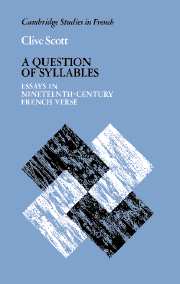Book contents
- Frontmatter
- Contents
- Prefatory Remarks
- 1 Theme and syllabic position
- 2 The octosyllable, rhythmicity and syllabic position
- 3 Figure and syllabic position
- 4 A privileged syllable
- 5 Rhythmicity and metricity
- 6 Rhythmicity and metricity in free verse
- Conclusion: Choice and Authority in verse
- Appendix The fundamentals of French versification
- Notes
- Bibliographical references
- Index
4 - A privileged syllable
The articulated e in Les Fleurs du Mal
Published online by Cambridge University Press: 21 October 2009
- Frontmatter
- Contents
- Prefatory Remarks
- 1 Theme and syllabic position
- 2 The octosyllable, rhythmicity and syllabic position
- 3 Figure and syllabic position
- 4 A privileged syllable
- 5 Rhythmicity and metricity
- 6 Rhythmicity and metricity in free verse
- Conclusion: Choice and Authority in verse
- Appendix The fundamentals of French versification
- Notes
- Bibliographical references
- Index
Summary
The e atone is, as Morier (1975) calls it, ‘une voyelle fragile’ (p. 378), an e instable, and views about its phonetic status and its expressive functions vary a great deal. No one would deny that in regular French verse, the unelided e has the status of a syllable, except when it occurs at the end of the line as a marker of a feminine rhyme. But does its syllabic status justify its phonetic realisation, as a definite enunciation? My view is still (French Verse-Art, p. 20) the same as that expressed by Theodor Elwert (1965): ‘Si on veut lire correctement les vers français et leur garder leur caractère de vers, il faut sans aucun doute prononcer l'e caduc à l'intérieur du vers’ (p. 56). But if this is so, how pronounced is its pronunciation? And here Guiraud (1970) seems to me to have the right answer: ‘Enfin, la diction poétique en prononçant l'e sourd admet des variations de durée qui vont du simple soupir à une articulation pleine’ (p. 102). There seems little point in trying to categorise, and locate the contexts of, these variations; the articulated e is such a special and controversial case and for that reason so vulnerable to recitational/readerly contingencies, to paralinguistic features, that any attempts to define its pronunciation must remain pure speculation; we may admire Morier's effort to fix the degrees of the articulated e's duration and intensity on a scale from 6 to 0 in relation to specific contexts, but his own conclusion is the only tenable one:
Le lecteur voudra bien considérer les données de cette classification comme purement relatives; elles dépendent de multiples facteurs: variations du débit, fluctuation du temps, jeu des compensations, charge phonétique.
(1975, p. 385)- Type
- Chapter
- Information
- A Question of SyllablesEssays in Nineteenth-Century French Verse, pp. 86 - 116Publisher: Cambridge University PressPrint publication year: 1986

